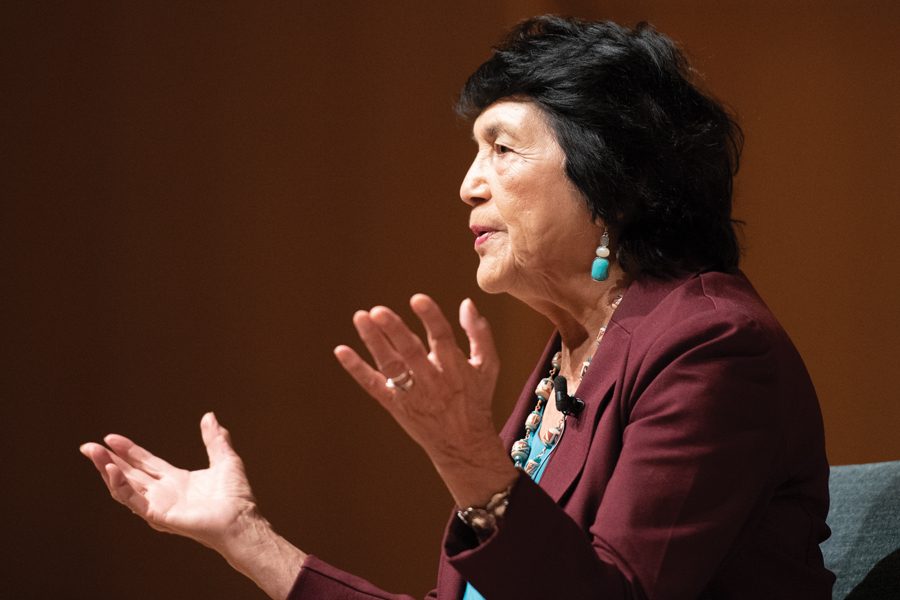Dolores Huerta hits history, politics, education
October 12, 2018
The Northwestern University Women’s Center kicked off its year-long theme of “Gender, Work, & Power” with a keynote address by civil rights activist Dolores Huerta on Thursday.
The speech, fittingly given on International Day of the Girl Child, was introduced by Women’s Center director Sekile Nzinga-Johnson and associate director Njoki Kamau. They highlighted Huerta’s work under the Dolores Huerta Foundation and the many awards she has won.
The room erupted in a standing ovation as Huerta took her seat on the low stage of Pick-Staiger Concert Hall, smiling humbly from the living room set up complete with an artificial flower in full bloom. Huerta set the tone of her address from the start, saying, “I think it is time for a healing,” to the 500 students in attendance.
Despite her soothing statement, she didn’t shy away from jumping into controversial current events, such as the nomination hearing of Brett Kavanaugh and racialized police brutality. Huerta characterized the political climate as one of “abysmal ignorance,” diving into an examination of the country’s origins to provide context for her criticism of the present day.
“(White supremacists) obviously don’t know the real history of the United States,” said Huerta. “Our government was formed by immigrants… When their parents came to this country, it was a brown country. It was a country of indigenous people… It was the African slaves that built the White House and the Congress.”
However, she punctuated her heavy subject content with quips of light-hearted humor.
“Mexicans are good, by the way,” Huerta joked with a thumbs-up while recalling the genocide of Native Americans and Mexicans during the Texas Revolution.
Her speech oscillated between the 1955 murder of Emmett Till to her experience meeting an immigrant mother from Guatemala whose child had been taken from her while she was sleeping.
Nevertheless, her solution remained the same: an increase in education and awareness.
“We have the structure, but what we need to do is change the content,” Huerta said, calling on the current administration to end what she called an attack on the public school system and instead incorporate into the curriculum the history of different racial groups within America as well as the labor and civil rights movements.
Otherwise, she argued, children of color lack recognition and respect while white children are left to “eat the poison of white supremacy and white privilege.”
Huerta’s nostalgic recollection of the many contributions of the labor movement piqued the interest of Medill freshman Zamone Perez, the child of two teachers.
“We only hear about labor in terms of conflict between business and the workers, but we fail to recognize a lot of benefits that came from the labor movement, such as paid healthcare,” he said.
Weinberg sophomore Alex Dickey, a resident of Huerta’s home state New Mexico, was similarly rejuvenated by Huerta’s address.
“It is so hard when you’re in an environment like Northwestern that is so draining … and everything is so stressful and you have all these commitments to remember that, yes, you can,” Dickey said. “You can change the world. All of us are here because, at this age, we have a little bit of wanting to change the world in us. It’s just a matter of reclaiming that power… ‘Sí se puede,’ that’s it. Yes, we can; yes, I can.”
Huerta ended her address by asking the audience, “Who has the power?”
The response, “We have the power,” quickly turned into a chant of “Sí se puede,” as she gazed into the crowd with her hands clasped in front of her.
“We have to be educators. We have to be messengers of truth and messengers of justice,” she concluded. “There’s a tsunami coming, and it’s going to be all of you.”
Email: meganmunce2022@u.northwestern.edu
Twitter: @meganmuncie



